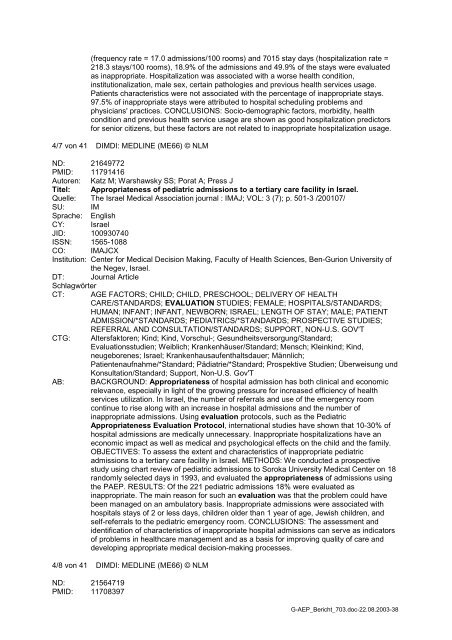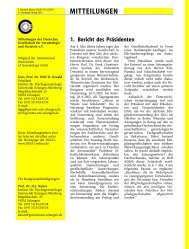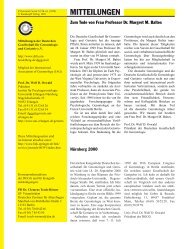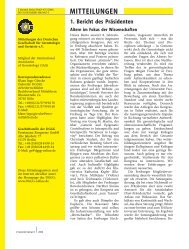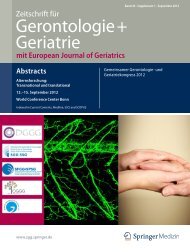G-AEP-Kriterien - Deutsche Gesellschaft für Gerontologie und ...
G-AEP-Kriterien - Deutsche Gesellschaft für Gerontologie und ...
G-AEP-Kriterien - Deutsche Gesellschaft für Gerontologie und ...
Erfolgreiche ePaper selbst erstellen
Machen Sie aus Ihren PDF Publikationen ein blätterbares Flipbook mit unserer einzigartigen Google optimierten e-Paper Software.
(frequency rate = 17.0 admissions/100 rooms) and 7015 stay days (hospitalization rate =<br />
218.3 stays/100 rooms), 18.9% of the admissions and 49.9% of the stays were evaluated<br />
as inappropriate. Hospitalization was associated with a worse health condition,<br />
institutionalization, male sex, certain pathologies and previous health services usage.<br />
Patients characteristics were not associated with the percentage of inappropriate stays.<br />
97.5% of inappropriate stays were attributed to hospital scheduling problems and<br />
physicians' practices. CONCLUSIONS: Socio-demographic factors, morbidity, health<br />
condition and previous health service usage are shown as good hospitalization predictors<br />
for senior citizens, but these factors are not related to inappropriate hospitalization usage.<br />
4/7 von 41 DIMDI: MEDLINE (ME66) © NLM<br />
ND: 21649772<br />
PMID: 11791416<br />
Autoren: Katz M; Warshawsky SS; Porat A; Press J<br />
Titel: Appropriateness of pediatric admissions to a tertiary care facility in Israel.<br />
Quelle: The Israel Medical Association journal : IMAJ; VOL: 3 (7); p. 501-3 /200107/<br />
SU: IM<br />
Sprache: English<br />
CY: Israel<br />
JID: 100930740<br />
ISSN: 1565-1088<br />
CO: IMAJCX<br />
Institution: Center for Medical Decision Making, Faculty of Health Sciences, Ben-Gurion University of<br />
the Negev, Israel.<br />
DT: Journal Article<br />
Schlagwörter<br />
CT: AGE FACTORS; CHILD; CHILD, PRESCHOOL; DELIVERY OF HEALTH<br />
CARE/STANDARDS; EVALUATION STUDIES; FEMALE; HOSPITALS/STANDARDS;<br />
HUMAN; INFANT; INFANT, NEWBORN; ISRAEL; LENGTH OF STAY; MALE; PATIENT<br />
ADMISSION/*STANDARDS; PEDIATRICS/*STANDARDS; PROSPECTIVE STUDIES;<br />
REFERRAL AND CONSULTATION/STANDARDS; SUPPORT, NON-U.S. GOV'T<br />
CTG: Altersfaktoren; Kind; Kind, Vorschul-; Ges<strong>und</strong>heitsversorgung/Standard;<br />
Evaluationsstudien; Weiblich; Krankenhäuser/Standard; Mensch; Kleinkind; Kind,<br />
neugeborenes; Israel; Krankenhausaufenthaltsdauer; Männlich;<br />
Patientenaufnahme/*Standard; Pädiatrie/*Standard; Prospektive Studien; Überweisung <strong>und</strong><br />
Konsultation/Standard; Support, Non-U.S. Gov'T<br />
AB: BACKGROUND: Appropriateness of hospital admission has both clinical and economic<br />
relevance, especially in light of the growing pressure for increased efficiency of health<br />
services utilization. In Israel, the number of referrals and use of the emergency room<br />
continue to rise along with an increase in hospital admissions and the number of<br />
inappropriate admissions. Using evaluation protocols, such as the Pediatric<br />
Appropriateness Evaluation Protocol, international studies have shown that 10-30% of<br />
hospital admissions are medically unnecessary. Inappropriate hospitalizations have an<br />
economic impact as well as medical and psychological effects on the child and the family.<br />
OBJECTIVES: To assess the extent and characteristics of inappropriate pediatric<br />
admissions to a tertiary care facility in Israel. METHODS: We conducted a prospective<br />
study using chart review of pediatric admissions to Soroka University Medical Center on 18<br />
randomly selected days in 1993, and evaluated the appropriateness of admissions using<br />
the P<strong>AEP</strong>. RESULTS: Of the 221 pediatric admissions 18% were evaluated as<br />
inappropriate. The main reason for such an evaluation was that the problem could have<br />
been managed on an ambulatory basis. Inappropriate admissions were associated with<br />
hospitals stays of 2 or less days, children older than 1 year of age, Jewish children, and<br />
self-referrals to the pediatric emergency room. CONCLUSIONS: The assessment and<br />
identification of characteristics of inappropriate hospital admissions can serve as indicators<br />
of problems in healthcare management and as a basis for improving quality of care and<br />
developing appropriate medical decision-making processes.<br />
4/8 von 41 DIMDI: MEDLINE (ME66) © NLM<br />
ND: 21564719<br />
PMID: 11708397<br />
G-<strong>AEP</strong>_Bericht_703.doc-22.08.2003-38


